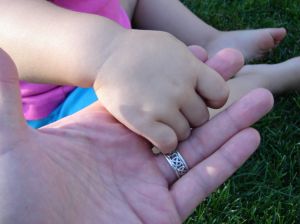 This week Tripp Curtis, the recently bereaved husband of “Mommy Life” blogger and author Barbara Curtis, posted a short article about his wife that read in part:
This week Tripp Curtis, the recently bereaved husband of “Mommy Life” blogger and author Barbara Curtis, posted a short article about his wife that read in part:
Barbara told how “seeing my children experience a happy childhood was the next best thing to having one myself.” She wished to “receive that kind of love.… Is it not a miracle that someone who missed an earthly father’s love can be healed to receive the love of the Heavenly Father?”
This woman, who had lost her own father at the age of five, and spent time in foster care, was no doubt shaped by those early experiences of loss. Those early wounds have the potential to make a person either harder . . . or stronger. Bitter . . . or more compassionate. In Barbara’s case, they widened her heart to include not only the children born from their union, but others who needed them as well.
 The Tender Touch of God
The Tender Touch of God
Like Barbara, my childhood experiences led me to become the kind of parent I am today. Thanks to my own father, I had no difficulty experiencing God as a loving Father. On the other hand, I’ve repeatedly found my idea of motherhood clearly (and not always pleasantly) defined by those childhood experiences as well.
To take one small example, Craig and I decided early on to become foster parents because, when I was young, my younger sister and I spent time in the home of various family friends and neighbors while my parents tended to the needs of my sister, who was battling cancer at the time. Not all those “placements” were as kind or patient as we needed them to be. I distinctly recall waking up, crying, one night, missing my parents, and being told to “Dry your eyes and grow up. Your parents have enough to worry about, without worrying about you.” I was ten years old. And I never forgot it.
Now, with my own ten-year-old, the temptation can be strong to tell her to grow up, to stop whining and carrying on about the tiniest scratch (self inflicted) or a cross look. The outbursts are especially irksome, given how often she subjects us to angry words and disrespectful retorts.
Happily, I’ve found that touch can be a great soothing balm at such times. The slow and gentle massage of a lotioned hand across her arms or calves. Tracing her face with a fingertip, making tiny circular motions all along her hairline and into her scalp. When her words or insomnia lets me know her anxiety level is high, these therapeutic touches do far more than words ever did.
This week’s psalm (25) evokes an image of God as the Father who guides us, taking us by the hand and gently leading us in the right way.
Good and upright is the LORD;
thus he shows sinners the way.
He guides the humble to justice,
and teaches the humble his way.
Significantly, it is not the self-confident or headstrong who are given this kind of fatherly treatment, but those who are humble enough to know they need to be shown the way.
What the psalm does not say – and what we do well to realize as we enter into this season of Advent – is that those who benefit most from the light, or from a gentle touch of guidance, are those most keenly aware of the darkness.
How has God used the darkness of your life to encourage you to shine the light elsewhere?
Copyright 2012 Heidi Hess Saxton
About the Author

Guest
We welcome guest contributors who graciously volunteer their writing for our readers. Please support our guest writers by visiting their sites, purchasing their work, and leaving comments to thank them for sharing their gifts here on CatholicMom.com. To inquire about serving as a guest contributor, contact editor@CatholicMom.com.


.png?width=1806&height=731&name=CatholicMom_hcfm_logo1_pos_871c_2728c%20(002).png)
Comments